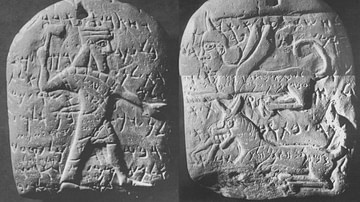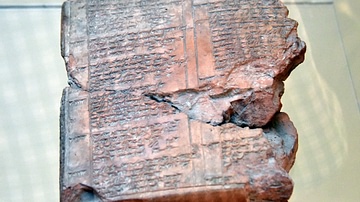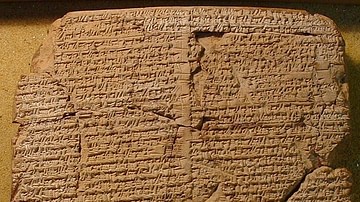Search
Search Results

Definition
Arslan Tash Amulet
Dated to the 7th century BCE, the Arslan Tash amulet (AT1) was discovered in Arslan Tash, Syria and contains the writing of Phoenician, magic incantations. The limestone plaque includes a variety of features: incantations perceived to prevent...

Image
Incantation Against Impotence Tablet from Hattusa
This clay tablet gives some methods of how to treat sexual impotency. For example: "If a man's potency comes to an end in the month of nisannu, you catch a male partridge, you pluck its wings, strangle it and flatter salt on it; you pound...

Image
Aramaic Incantation Bowl
A magical bowl with an incantation written in ink to ward off malevolent spirits. Clay, inscribed in Aramaic language, 3rd to 7th century CE. From Babylon, Iraq. (The Sulaimaniya Museum, Iraq).

Article
Enuma Elish - The Babylonian Epic of Creation - Full Text
The Enuma Elish (also known as The Seven Tablets of Creation) is the Babylonian creation myth whose title is derived from the opening lines of the piece, "When on High". The myth tells the story of the great god Marduk's victory over the...

Article
Medicine in Ancient Mesopotamia - A Gift of the Gods to Their People
In ancient Mesopotamia, the gods informed every aspect of daily life, including the practice of medicine. Gula, the Sumerian goddess of healing, presided over the medical arts, guiding doctors and dentists in the treatment of health problems...

Article
Ancient Mesopotamian Ghost Spell
Medicine in ancient Mesopotamia was based on the belief that illness was caused by supernatural agencies and, although medicines were given and injuries treated, magical spells and incantations were also understood as effective. Among these...

Definition
Heka
Heka is the god of magic and medicine in ancient Egypt and is also the personification of magic itself. He is probably the most important god in Egyptian mythology but is often overlooked because his presence was so pervasive as to make him...

Definition
Tiamat
Tiamat is the Mesopotamian goddess associated with primordial chaos and the salt sea best known from the Babylonian epic Enuma Elish. In all versions of the myth, following the original, Tiamat always symbolizes the forces of chaos, which...

Definition
Ghost Dance
The Ghost Dance (Spirit Dance) is an expression of rebirth and renewal using the traditional Native American circle dance, first practiced by the Paiute Nation in 1869 and again in 1889 when it was adopted by other Plains Indians nations...

Definition
Kabbalah
The term Kabbalah refers specifically to the form of Jewish mysticism that became widespread in the Middle Ages. However, in recent decades it has essentially become a generic term for the entirety of Jewish mystical thought. Literally meaning...